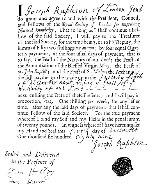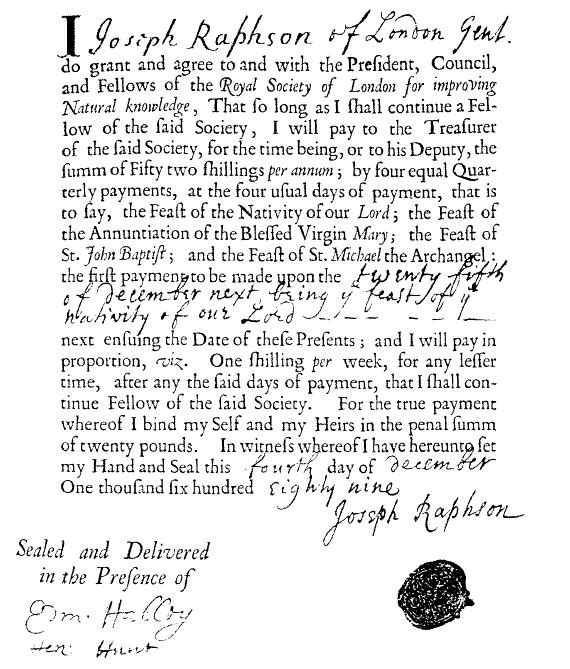
Joseph Raphson
Encyclopedia

England
England is a country that is part of the United Kingdom. It shares land borders with Scotland to the north and Wales to the west; the Irish Sea is to the north west, the Celtic Sea to the south west, with the North Sea to the east and the English Channel to the south separating it from continental...
mathematician
Mathematician
A mathematician is a person whose primary area of study is the field of mathematics. Mathematicians are concerned with quantity, structure, space, and change....
known best for the Newton–Raphson method. Little is known about his life, and even his exact years of birth and death are unknown, although the mathematical historian Florian Cajori
Florian Cajori
Florian Cajori was one of the most celebrated historians of mathematics in his day.- Biography :...
provided the approximate dates 1648–1715. Raphson attended Jesus College
Jesus College, Cambridge
Jesus College is a constituent college of the University of Cambridge, England.The College was founded in 1496 on the site of a Benedictine nunnery by John Alcock, then Bishop of Ely...
at Cambridge
University of Cambridge
The University of Cambridge is a public research university located in Cambridge, United Kingdom. It is the second-oldest university in both the United Kingdom and the English-speaking world , and the seventh-oldest globally...
, graduating with an M.A.
Master of Arts (Oxbridge)
In the Universities of Oxford, Cambridge and Dublin, Bachelors of Arts of these universities are admitted to the degree of Master of Arts or Master in Arts on application after six or seven years' seniority as members of the university .There is no examination or study required for the degree...
in 1692. He was made a Fellow of the Royal Society on 30 November 1689, after being proposed for membership by Edmund Halley.
Raphson's most notable work is Analysis Aequationum Universalis, which was published in 1690. It contains a method, now known as the Newton–Raphson method, for approximating the roots of an equation. Isaac Newton
Isaac Newton
Sir Isaac Newton PRS was an English physicist, mathematician, astronomer, natural philosopher, alchemist, and theologian, who has been "considered by many to be the greatest and most influential scientist who ever lived."...
had developed a very similar formula in his Method of Fluxions
Method of Fluxions
Method of Fluxions is a book by Isaac Newton. The book was completed in 1671, and published in 1736. Fluxions is Newton's term for differential calculus...
, written in 1671, but this work would not be published until 1736, nearly 50 years after Raphson's Analysis. However, Raphson's version of the method is simpler than Newton's, and is therefore generally considered superior. For this reason, it is Raphson's version of the method, rather than Newton's, that is to be found in textbooks today.
Raphson was a staunch supporter of Newton's claim, and not that of Gottfried Leibniz
Gottfried Leibniz
Gottfried Wilhelm Leibniz was a German philosopher and mathematician. He wrote in different languages, primarily in Latin , French and German ....
, to be the sole inventor of Calculus. In addition, Raphson translated Newton's Arithmetica Universalis
Arithmetica Universalis
100px|thumb|Title page of the Arithmetica, published 1707100px|thumb|The English translation by Raphson was published in 1720Arithmetica Universalis is a mathematics text by Isaac Newton. Written in Latin, it was edited and published by William Whiston, Newton's successor as Lucasian Professor of...
into English
English language
English is a West Germanic language that arose in the Anglo-Saxon kingdoms of England and spread into what was to become south-east Scotland under the influence of the Anglian medieval kingdom of Northumbria...
. The two were not close friends, however, as is evidenced by Newton's inability to spell Raphson's name either correctly or consistently .
Raphson seems to have coined the word pantheism
Pantheism
Pantheism is the view that the Universe and God are identical. Pantheists thus do not believe in a personal, anthropomorphic or creator god. The word derives from the Greek meaning "all" and the Greek meaning "God". As such, Pantheism denotes the idea that "God" is best seen as a process of...
, in his work De spatio reali, published in 1697, where it may have been found by John Toland
John Toland
John Toland was a rationalist philosopher and freethinker, and occasional satirist, who wrote numerous books and pamphlets on political philosophy and philosophy of religion, which are early expressions of the philosophy of the Age of Enlightenment...
.

